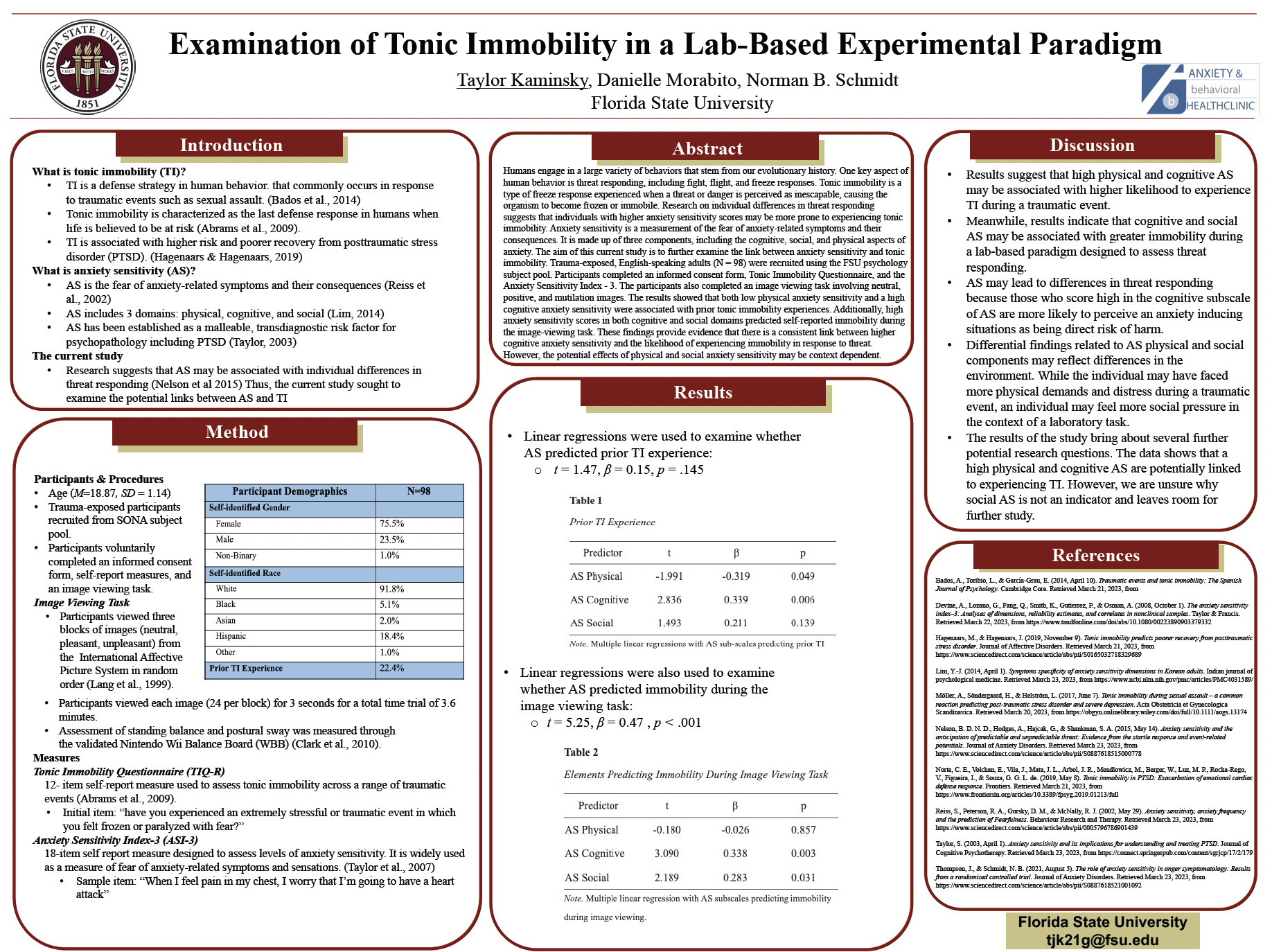Research Symposium
23rd annual Undergraduate Research Symposium, April 6, 2023
Taylor Kaminsky Poster Session 2: 1:30 pm - 2:30 pm/ Poster #406

BIO
Taylor Kaminsky is a third-year psychology undergraduate student in the College of Arts and Sciences at Florida State University. With a keen interest in clinical psychology, Taylor is actively involved in research with FSU's Anxiety and Behavioral Health Clinic by working as a Research Assistant on topics relating to anxiety sensitivity, threat responding, post-traumatic stress disorder, and tonic immobility. As a Research Assistant, Taylor has gained valuable insight into academic processes surrounding the publication of academic research, as well as technical skills such as accurately preparing and operating electroencephalograph equipment which he believes will serve as a strong foundation for future endeavors in the realm of academia.
In addition to his academic pursuits, Taylor has worked as a Laboratory Assistant at Tallahassee Memorial Healthcare's Surgical Pathology Laboratory for the past two years. This position has provided him with direct exposure to a clinical laboratory where he has worked closely with various healthcare professionals and their roles in patient care.
Taylor's ultimate goal is to attend medical school and become a psychiatrist. He believes that the combination of research and clinical exposure will prove invaluable in a future career as a medical professional.
Examination of Tonic Immobility in a Lab-Based Experimental Paradigm
Authors: Taylor Kaminsky, Danielle MorabitoStudent Major: Psychology
Mentor: Danielle Morabito
Mentor's Department: Clinical Psychology Mentor's College: College of Arts and Sciences Co-Presenters: N/A
Abstract
Humans engage in a large variety of behaviors that stem from our evolutionary history. One key aspect of human behavior is threat responding, including fight, flight, and freeze responses. Tonic immobility is a type of freeze response experienced when a threat or danger is perceived as inescapable, causing the organism to become frozen or immobile. Research on individual differences in threat responding suggests that individuals with higher anxiety sensitivity scores may be more prone to experiencing tonic immobility. Anxiety sensitivity is a measurement of the fear of anxiety-related symptoms and their consequences. It is made up of three components, including the cognitive, social, and physical aspects of anxiety. The aim of this current study is to further examine the link between anxiety sensitivity and tonic immobility. Trauma-exposed, English-speaking adults (N = 98) were recruited using the FSU psychology subject pool. Participants completed an informed consent form, Tonic Immobility Questionnaire, and the Anxiety Sensitivity Index - 3. The participants also completed an image viewing task involving neutral, positive, and mutilation images. The results showed that both low physical anxiety sensitivity and a high cognitive anxiety sensitivity were associated with prior tonic immobility experiences. Additionally, high anxiety sensitivity scores in both cognitive and social domains predicted self-reported immobility during the image-viewing task. These findings provide evidence that there is a consistent link between higher cognitive anxiety sensitivity and the likelihood of experiencing immobility in response to threat. However, the potential effects of physical and social anxiety sensitivity may be context-dependent.
Keywords: psychology, anxiety, TI, AS


